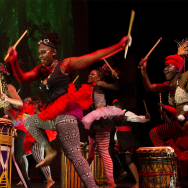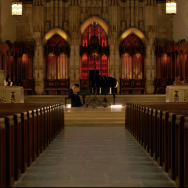Buoyed by the popularity of small jazz performances in Hyde Park and by the South Side’s rich jazz heritage, representatives from cultural institutions in the community came up with a simple idea 15 years ago that they thought might achieve several worthy goals. The concept: staging a neighborhood jazz festival.
It worked, and continues to do so, for reasons based in the festival’s unique construction, robust support from the University of Chicago and extensive volunteer network.
“The university was absolutely fundamental to our doing this,” recalled longtime Hyde Park resident Judith Stein, AB’1962, AM’1964, who became co-founder of the Hyde Park Jazz Festival and serves on its board. “Without it, this couldn’t have happened.”
The 15th annual festival, set for Sept. 25-26, will be presented almost entirely at outdoor venues and is expected to reflect the event’s growing popularity. Attendance in each of the last few years—except for a 2020 version scaled back to accommodate COVID-19 safety measures—drew 15,000 to 20,000 people. Between 2,000 and 5,000 attended the inaugural fest in 2007.
This year’s slightly condensed format will feature 30 concerts performed in six diverse venues across Hyde Park. Festival attendees can catch Regina Carter, Junius Paul, and Tomeka Reid, for example, on the Midway Plaisance, and Thaddeus Tukes with Ashley Jackson in the Smart Museum Courtyard. The Mai Sugimoto Trio will play at the Augustana Church parking lot and the Jeremiah Collier Quartet is performing on the north terrace of the DuSable Museum. Two performances—Makaya McCraven and Ensemble Dal Niente & Ken Vandermark—are indoors, at the Reva and David Logan Center for the Arts.
All of it is free of charge.
Entry to diverse, cultural riches
The free admission and the venues underscore one objective organizers had in mind when conceiving the festival years ago. The group wanted to open institutions to local residents and others outside the area who may have been unaware, unable or reluctant to explore the abundant arts offerings at those institutions. The hope was that attendees would get to know all of Hyde Park better.
That objective was one reason UChicago enthusiastically supported the event.
“The festival resonated with our engagement mission in a number of ways,” said Derek Douglas, UChicago’s vice president for civic engagement and external affairs. He noted that, in addition to significant financial support that was vital in the festival’s early years, the University of Chicago provided marketing and related services, and offered several campus venues.
“The fact that it’s free was something the university pressed for because it opens access to everyone, which helps us create a bridge to community members,” Douglas added. “And utilizing all these wonderful venues—museums, performance halls, arts centers—at the university and throughout the community, invites people from around the corner and around the world to explore the diverse, cultural riches in Hyde Park.”
He also noted that the festival supports local musicians in an art form engrained in the South Side, where legends such as Louis Armstrong, Nat "King" Cole, Dinah Washington, and King Oliver—among many—lived and refined jazz music.
Finally, the festival was community-driven, Douglas said.
“We love the idea that this came from people who live, work and care deeply about Hyde Park and the South Side,” he added. “It’s not only community-conceived; it’s community-led. Those are big reasons we continue supporting the fest.”
Community pride in the festival manifests itself in several ways, Douglas said.
Although all events are free, donations are welcome. When volunteers pass the hat—or bucket—at performances, attendees are extremely generous, he added.
The volunteers are another important element of community spirit, noted Kate Dumbleton, festival co-artistic and executive director. More than 250 volunteers make the festival run, she said.
“If you really think about that number,” Dumbleton added, “it’s astonishing. We could not do this festival without them. It’s a very, very clear example of how much this community cares about the festival.”
Keys to growing popularity
While the university remains Jazz Fest’s leading sponsor, festival planners have prioritized fundraising to ensure that free admission continues. Organizations including the Richard H. Driehaus Foundation, John D. and Catherine T. MacArthur Foundation, National Endowment for the Arts, and Walder Foundation are among more than 20 sponsors of the festival.
Throughout the fest’s long run, the community’s passion for jazz remains constant and is one of several factors contributing to the festival’s growing popularity.
“The South Side is an area where this culture resonates,” Dumbleton said. “It’s arguably one of the most important geographies of jazz in the world. That’s just a fact.”
Over the years, organizers have invited more performers, including national artists of diverse ages and genders and those who play a broader definition of the musical genre. The fest also has commissioned nine new works and nearly a dozen special projects, including new arrangements and collaborations, since 2014.
At the same time, the celebration concentrates on promoting local talent—this year with a twist. Local musicians were asked to invite national artists as collaborators.
“You’re not going to hear these collaborations anywhere else,” Dumbleton said. “It’s going to make the festival totally unique.”
All those factors, plus the exciting, eclectic experience of moving from one interesting venue to another, have drawn increasing numbers to the festival, observers said.
“The festival has become such a source of pride for Hyde Park,” Douglas said. “And the wonderful, cumulative effect of the celebration is that it brings together so many people. We see newcomers with long-time residents, and people of all ages and cultures enjoying each other’s company, brought together by the music of the South Side.”
—This story was originally published by the Office of Civic Engagement.

